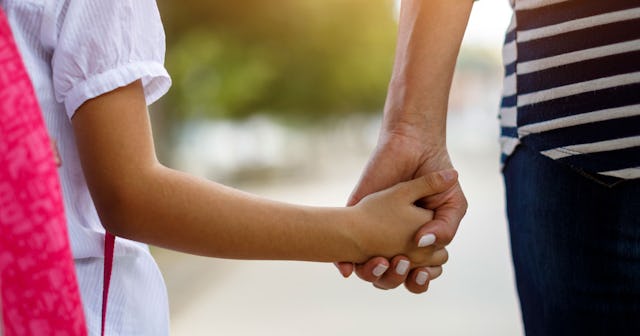New Approach To Managing Childhood Anxiety Treats Parents, Not Kids

The program teaches parents how to allow their child to experience anxiety
If you have a child who has been diagnosed with anxiety or exhibits signs of anxious behavior, you know it can be devastating to watch. Our first reaction as parents is to step in and try to alleviate the source of their anxiety by trying to “fix” things for them — be it through therapy or some sort of accommodation. But a new study finds that a parent’s response to their child’s anxiety can often make the situation worse, not better.
An experimental program that treats parents, not children, is a part of a Yale University study aimed at treating children’s anxiety by teaching their parents a new way to respond to it. “The parent’s own responses are a core and integral part of childhood anxiety,” says Eli Lebowitz, a psychologist at the Yale School of Medicine, and developer of the training.
Supportive Parenting for Anxious Childhood Emotions (SPACE) is a parent-based treatment that reduces a parent’s accommodation of childhood anxiety, showing that our reaction (which is usually comforting) can often be counterproductive and increase our kids’ anxiety instead of help it.
“These accommodations lead to worse anxiety in their child, rather than less anxiety,” Lebowitz said. So, how can attempting to comfort our child and interjecting ourselves to try to help our kids make it worse? Lebowitz says it’s because our kids are becoming reliant on us to “make it better” instead of learning how to cope with it on their own.
A certain amount of anxiety in childhood is normal, but according to the Anxiety and Depression Association of America, one in eight children in the U.S. suffer from an anxiety disorder. Research shows that “untreated children with anxiety disorders are at higher risk to perform poorly in school, miss out on important social experiences, and engage in substance abuse.” Determining how a parent can impact their child’s anxiety in a positive way is critical.
“When you provide a lot of accommodation, the unspoken message is, ‘You can’t do this, so I’m going to help you,’ ” he said. To combat this, the SPACE program changes the dynamic and teaches parents how to step back and let their child learn to manage their anxiety on their own, supporting them as they go.
This is a vast difference from cognitive behavioral therapy, the most common approach to treating anxiety. CBT tries to identify and change negative thinking patterns and teaches positive behavioral changes in the person suffering from anxiety. But for kid’s who suffer, Lebowitz believes parents play more of a role in the treatment and future outcome of their child’s ability to manage it successfully.
A study of the approach appeared in the Journal of the American Academy of Child & Adolescent Psychiatry in March and for those who’ve gone through the SPACE program, the outcomes have been positive. “Family accommodation and parenting stress were significantly reduced in both treatments, with significantly greater reduction in family accommodation following SPACE, compared to CBT,” the study finds.